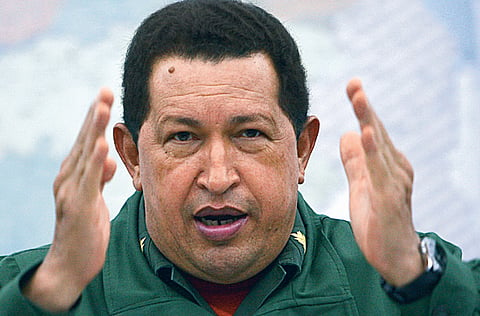Coup against the constitution
Rather than share power with Venezuelan opposition, Chavez curtails powers of newly elected legislature

In an election for the National Assembly last September, Venezuelan voters sent a clear message to Hugo Chavez, their autocratic elected president. Slightly more of them voted for opposition candidates than for the ruling party and its allies.
Thanks to the government's manipulation of the electoral rules, the opposition's votes only translated into 67 seats, whereas the Chavistas ended up with 98. But even that was not secure enough for Chavez.
He has used the final three months of the outgoing assembly, in which he has an overwhelming majority, to render irrelevant the incoming legislature, due to be sworn in tomorrow. The centrepiece of this effort is an enabling law which grants the government the power to rule by decree for the next 18 months.
The assembly's other functions have been curtailed too. Under a swiftly approved reform of its internal rules, the legislature will now meet as little as four days a month. All parliamentary commissions will be controlled by the government, and speeches to the assembly on any given topic will be limited to a total of 15 minutes per member. Debates will only be transmitted by government tele-vision channels, allowing the authorities to gag dissident voices.
In addition, assembly members will henceforth be barred from swapping parties on pain of losing their seat — a measure which suggests that Chavez doubts the loyalty of some of his own supporters.
Meanwhile some of the opposition members face judicial persecution. Jose Sanchez, a former police commander, has been sentenced to 19 years in jail for his supposed involvement in a murder, even though the constitution grants assembly members legal immunity.
The new assembly was due to appoint several supreme-court justices to replace those due to retire. Such appointments require a two-thirds majority, and thus would have involved an agreement with the opposition.
To circumvent the need for that, the outgoing assembly rushed through the naming of nine new justices (and 32 stand-ins). All are chavista loyalists, and four are retiring assembly members.
The outgoing assembly also rubber-stamped other far-reaching measures. A new higher-education law ends the autonomy of the main universities and gives administrative and blue-collar staff equal rights with (more troublesome) academics in electing rectors. Non-governmental organisations will not be allowed to receive funding from abroad, a change which may force many to close.
Another new law allows the president to transfer the powers and resources of local government to socialist communes, potentially neutering the opposition's electoral victories in many big cities in 2008.
Gagging detractors
Reforms to the broadcasting and telecommunications laws, which have now been extended to cover the internet and mobile telephones, seek to restrict the distribution of information critical of the government by making the carrier of the message liable for the content. Punishment will be meted out for messages deemed to promote disrespect for the country's institutions or ‘alarm' among the population.
Chavez justified the enabling law — a device he has used previously during his dozen years in office — as a necessary response to flooding that has killed 40 people. That seemed a particularly lame argument. In the view of the opposition, his legislative blitzkrieg amounts to a coup by the executive against other branches of government, in violation of the 1999 constitution which Chavez himself inspired.
Calling the government a "tyranny" seeking to install a "communist system", the opposition called for "peaceful but energetic" resistance. The universities and business groups are among those organising against Chavez's onslaught.
In western Venezuela, farmers, in many cases backed by their labourers, have blocked roads to prevent the army from executing a presidential order to expropriate their land around Lake Maracaibo.
All eyes are now fixed on a presidential election in two years time, at which Chavez says he will seek yet another six-year term. The president and his most senior general have both said that the armed forces will not tolerate an opposition victory in that election.
Peaceful protesters outside parliament against the new laws have been attacked by the government's thugs, as well as by the security forces. All this suggests that the government is trying to provoke the opposition to violence.
Although the opposition has long accused Chavez of ruling as a dictator, Venezuela has hitherto retained many of the outward appearances of democracy. Now, it seems, the president is finally taking off his democratic mask.


